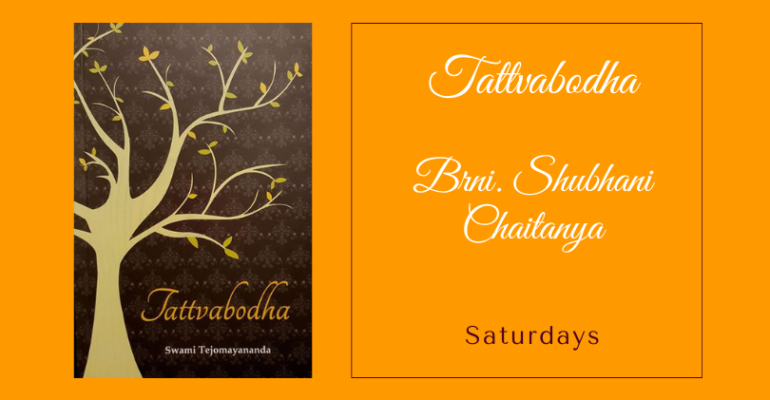Podcast on Spotify
The Self is beyond the five sheaths
मदीयं शरीरं मदीयाः प्राणाः मदीयं मनश्च
मदीया बुद्धिर्मदीयं अज्ञानमिति स्वेनैव ज्ञायते
तद्यथा मदीयत्वेन ज्ञातं कटककुण्डल गृहादिकं
स्वस्माद्भिन्नं तथा पञ्चकोशादिकं स्वस्माद्भिन्नम्
मदीयत्वेन ज्ञातमात्मा न भवति ॥
madīyaṃ śarīraṃ madīyāḥ prāṇāḥ madīyaṃ manaśca
madīyā buddhirmadīyaṃ ajñānamiti svenaiva jñāyate
tadyathā madīyatvena jñātaṃ kaṭakakuṇḍala gṛhādikaṃ
svasmādbhinnaṃ tathā pañcakośādikaṃ svasmādbhinnam
madīyatvena jñātamātmā na bhavati .
Just as bangles, earrings, house etc., known as ‘mine are all other than knower ‘me’, so too, the five sheaths etc., are known by the Self as my body, my prāṇās, my mind, my intellect, and my knowledge and are therefore not the Self.
Explanation
- Whatever is mine cannot be I, the Self – this is the principle
- Then as per this principle – none of the five sheaths can be the I, the Self, since they are taken up to be mine
- Similarly, that which is experienced as an object, cannot be the subject
- Therefore, the subject, the Self, cannot be any of these five sheaths
Definition of the Self
आत्मा तर्हि कः ?
सच्चिदानन्दस्वरूपः ।
सत्किम् ?
कालत्रयेऽपि तिष्ठतीति सत् ।
चित्किम् ?
ज्ञानस्वरूपः ।
आनन्दः कः ?
सुखस्वरूपः ।
एवं सच्चिदानन्दस्वरूपं स्वात्मानं विजानीयात् ।
ātmā tarhi kaḥ ?
saccidānandasvarūpaḥ
satkim ?
kālatraye’pi tiṣṭhatīti sat .
citkim ?
jñānasvarūpaḥ .
ānandaḥ kaḥ ?
sukhasvarūpaḥ .
evaṃ saccidānandasvarūpaṃ svātmānaṃ vijānīyāt
Then what is the Self?
It is of the nature of Existence, Consciousness, Bliss.
What is existence? That which remains unchanged in the three periods of time (past, present and future) is Existence.
What is Consciousness? It is of the nature of absolute knowledge.
What is Bliss? It is of the nature of absolute happiness.
Thus one should know oneself to be of the nature of Existence-Consciousness-Bliss.
Explanation of Existence
- Existence is changeless
- In all three states: waking, dream, sleep, there is a changeless presence, even though gross and subtle objects change, that changeless presence is Existence
- The Self is changeless in all periods of time, past, present and future. When we were children, then teenagers, then through middle age and old age, our knowledge, our emotions, our roles keep changing, but there is a changeless presence, that changeless presence is Existence
- This Existence is also beyond space or time. We see this in deep sleep where there is no space or time, but the changeless presence remains
- Existence is independent of names and forms
- We can exist independently of all things and all beings – this independent existence is the Self
- All things and beings, all names and forms exist in the Self, their existence is borrowed from the Self
- The Self is the substratum and so it supports all names and forms, but is independent of those names and forms
- Nothing can break this Existence because names and forms are supported by Existence, and Existence is not affected by them
Additional Explanation
- Meditation on the Self is not as an object but as a subject, through negation – I am not the body, not the mind, not the ego, not any emotion, not any thought
- In terms of understanding what we think of as death – all of our bodies are like pots, and space is like the Self. Pots may break, but space remains. Similarly, only the body dies, and the individuality takes up another body. All of this is happening in the Self.
- Īśvara represents the totality of creation as a name and form, but the goal is to ultimately go beyond name and form. Ganeshji is immersed after the 10 day celebration to symbolize this.
Explanation of Consciousness
- Consciousness is the subject
- For any experience, three things are needed: experiencer (e.g. ego), experienced (e.g. book) and experiencing (relationship between the two)
- This experience is only possible because of Consciousness, which is illumining all 3 – the experiencer, experienced object and experiencing

